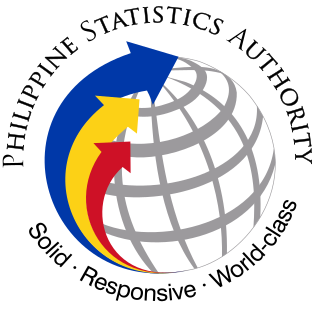Related Research Articles

A municipality is a local government unit (LGU) in the Philippines. It is distinct from city, which is a different category of local government unit. Provinces of the Philippines are divided into cities and municipalities, which in turn, are divided into barangays – villages. As of June 30, 2024, there are 1,493 municipalities across the country.

The Philippine Statistics Authority is the central statistical authority of the Philippine government that collects, compiles, analyzes, and publishes statistical information on economic, social, demographic, political affairs, and general affairs of the people of the Philippines, as well as enforcing the civil registration functions in the country.
The Federal Bar Association (FBA) is the primary voluntary professional organization for private and government lawyers and judges practicing and sitting in federal courts in the United States. Six times a year, the FBA prints The Federal Lawyer, which includes the latest news of interest to the federal legal community. The magazine features articles by attorneys and judges, book reviews, the latest Supreme Court rulings, judicial profiles, and thorough coverage of FBA activities.
The Philippines is divided into four levels of administrative divisions, with the lower three being defined in the Local Government Code of 1991 as local government units (LGUs). They are, from the highest to the lowest:
- Regions are mostly used to organize national services. Of the 17 regions, only one—the Bangsamoro Autonomous Region in Muslim Mindanao—has an elected government to which the central government has devolved competencies.
- Provinces, independent cities, and one independent municipality (Pateros)
- Component cities and municipalities within a province
- Barangays within a city or municipality
Human rights in the Philippines are protected by the Constitution of the Philippines, to make sure that people in the Philippines are able to live peacefully and with dignity, safe from the abuse of any individuals or institutions, including the state.

The Philippines' Department of Social Welfare and Development is the executive department of the Philippine Government responsible for the protection of the social welfare of rights of Filipinos and to promote social development.
The Union of Local Authorities of the Philippines (ULAP) is the umbrella organization of all leagues of local government units (LGUs) and locally elected government officials, and was formed in 1998, registered in 1999, and further endorsed through Executive Order 351, series of 2004.

The municipalities of El Salvador are the second-level administrative divisions within the Republic of El Salvador. These municipalities divide the country's departments and serve as the fundamental administrative units of local government.
Sangguniang Panlalawigan, commonly known as the Provincial Board, are the legislatures in Philippine provinces. They are the legislative branches of the provinces, and their powers and responsibilities are defined by the Local Government Code of 1991. Along with the provincial governor, the executive branch of the province, they form the province's government.

The League of Provinces of the Philippines (LPP), also referred to as the League of Provinces, is an organization composed of governors of the provinces in the Philippines. All of the 82 provinces are members of the organization.

The University of the Philippines - National College of Public Administration and Governance, a degree-granting unit of the University of the Philippines Diliman, is the first school of public administration and public policy in Asia and the top educational institution in the said academic field and practice in the Philippines. It was established in 1952.
A barangay councilor is an elected government official who is a member of the Sangguniang Barangay of a particular barangay, the smallest political unit in the Philippines. Each barangay council has seven regular councilors who are elected at-large by multi-member plurality voting. Barangay councilors are elected to three-year terms and are term-limited to three consecutive terms.

The Liga ng mga Barangay sa Pilipinas and the Asosasyon ng mga Kapitan ng Barangay are formal organizations of all the barangays in the Philippines. Presently, almost 42,000 barangays are part of this organization, making it the association of Philippine local government units with the largest membership.

The League of Municipalities of the Philippines - or more simply the League of Municipalities or LMP - is a formal organization of all the municipalities in the Philippines. Presently, one thousand four hundred eighty municipalities are part of this organization.

The Indigenous Peoples' Rights Act of 1997 (IPRA), officially designated as Republic Act No. 8371, is a Philippine law that recognizes and promotes the rights of indigenous cultural communities and Indigenous peoples in the Philippines.
The Early Childhood Care and Development (ECCD) Council is a national government agency in the Philippines mandated to implement the National ECCD System which refers to the full range of health, nutrition, early education and social services development programs that provide for the basic holistic needs of young children from age zero (0) to four (4) years; and to promote their optimum growth and development. Stated in Section 5 of Republic Act 10410, "The ECCD System shall ensure that the National ECCD Program is implemented in accordance with quality standards for accreditation and for this purpose there shall be established a National ECCD Monitoring and Evaluation Framework." RA 10410 is “An Act Recognizing The Age From Zero (0) To Eight (8) Years As The First Crucial Stage Of Educational Development And Strengthening The Early Childhood Care And Development System Appropriating Funds Therefor and For Other Purposes.”

The National Electrification Administration is a government-owned and controlled corporation (GOCC) attached to the Department of Energy of the Philippines tasked in the full implementation of the rural electrification program (REP) and reinforce the technical capability and financial viability of the 121 rural electric cooperatives (ECs).

In the Philippines, disability is one of the social issues affecting a portion of the Philippines' population. To ensure the equality and rights of disabled persons, there are Philippine laws and policies that were passed regarding persons with disabilities (PWDs). There are also numerous non-government associations that seeks to encourage and help improve the wellbeing of people with disabilities.
The Baguio City Council is Baguio's Sangguniang Panlungsod or legislative body. The council has 15 members which is composed of 12 councilors, one ex officio member elected from the ranks of barangay (neighborhood) chairmen, one ex officio member elected from the ranks of Sangguniang Kabataan chairmen and one presiding officer. The Vice-mayor of the city is the presiding officer of the council, who is elected citywide.

The Commission on Population and Development, or CPD, is a Philippine government agency and the lead policy-making and coordinating organization of the country's population management programs.
References
- ↑ "LCP Mandate". League of Cities of the Philippines. 2009. Archived from the original on February 4, 2009. Retrieved August 22, 2009.
- 1 2 3 4 5 6 7 8 9 10 "The Local Government Code of the Philippines, Book 3" (PDF). Department of Interior and Local Government. 2009. Archived from the original (PDF) on August 21, 2010. Retrieved August 22, 2009.
- 1 2 "LCP Vision/Mission". League of Cities of the Philippines. 2009. Archived from the original on August 7, 2009. Retrieved August 22, 2009.